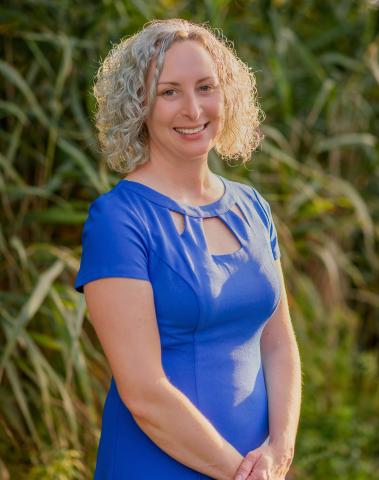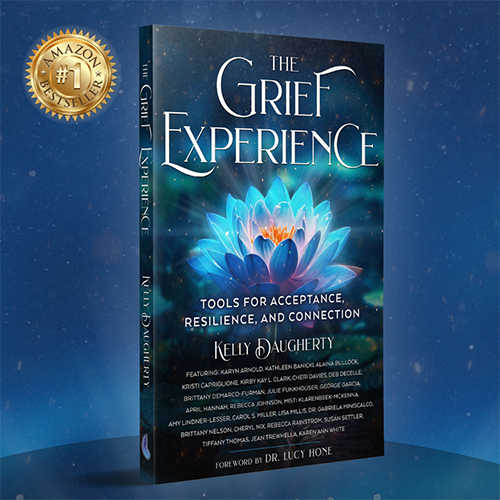Social Work Alumna Shares Resources for Grief and Loss in New Book

Kelly Daugherty (MSW 2002), the founder of Greater Life Grief Counseling and the Center for Informed Grief, LLC, has dedicated her career to providing resources and support for individuals facing the challenges of grief and loss.
“I have always wanted to write a book on grief and loss but didn’t know where to start,” she shared. “Having been a part of a collaborative book, Holistic Mental Health, in 2022, I thoroughly enjoyed being part of the process. This experience inspired me to approach the publisher to lead a book specifically focused on grief and loss.”
The resulting book, The Grief Experience: Tools for Acceptance, Resilience, and Connection, brings together expertise to offer essential insights and actionable strategies for those navigating the grief journey.
“Grief is often a challenging topic due to societal norms in the United States,” Daugherty explained. “While grief is a normal response to loss, our society doesn’t talk about it. Individuals, including social workers, struggle with what to say or how to support someone who is grieving effectively.”
One of the misconceptions of bereavement and grief that she seeks to dispel is the belief that grief follows set stages. Elizabeth Kubler-Ross popularized this notion of grief in 1969, which was initially applied to individuals facing their own death but was later extended to grieving individuals. “This model has been widely debunked and lacks empirical evidence and can make grieving individuals feel like they are doing their grief wrong,” stressed Daugherty. “Grief is a highly individualized experience that defies any predetermined timeline or sequence of stages.”
 In her book, Daugherty brings together 25 authors who each share their journey of grief and loss, along with tools designed to assist readers in navigating their own bereavement experiences. These tools encompass various approaches, including developing personalized self-care plans, practicing meditation, journaling, incorporating movement, and exploring artistic expression.
In her book, Daugherty brings together 25 authors who each share their journey of grief and loss, along with tools designed to assist readers in navigating their own bereavement experiences. These tools encompass various approaches, including developing personalized self-care plans, practicing meditation, journaling, incorporating movement, and exploring artistic expression.
As grief can be exhausting and overwhelming, individuals may attempt to avoid their grief and resort to unhealthy coping mechanisms. “It’s crucial to have healthy coping methods for grief because they enable us to navigate the pain constructively, safeguarding our mental and physical well-being. Grief impacts us emotionally, cognitively, behaviorally, physically, and spiritually,” she described.
Daugherty’s journey toward specializing in bereavement began with her own experiences with grief when her mother died of breast cancer when she was 14 years old. She feels fortunate to have an abundance of support, including a hospice grief group for teens that helped her feel less alone. “During that time, I encountered an extraordinary social worker who played a pivotal role in guiding me through the ups and downs,” she recalled. This guidance led her to volunteer with children’s grief programs.
“My journey through grief ignited a passion within me to help others navigate their own grief experiences with understanding, empathy, support, and find meaning in my grief,” said Daugherty.
Her book represents a way for Daugherty to share her passion and skills to support others more broadly. “One of my favorite aspects of my career is providing training and continuing education, especially to therapists and school personnel. It’s empowering them to become more grief-informed and feel more confident in supporting grieving children and adults.”
Daugherty also provides therapy to individuals and groups through her private practice, including a program she co-created called Healing Strides that combines therapeutic group work with training for a 5k race. “Witnessing their resilience and growth as they navigate the complexities of loss is not only deeply fulfilling but also reaffirms the importance of compassionate care during times of grief,” she affirms.
This compassionate care is also something Daugherty takes into account for herself when helping people navigate the rocky emotional terrain of loss, prioritizing self-care, personal growth, and continuing education for best practices. Gaining experience with supporting clients with grief and loss is something she recommends for anyone in the helping profession.
“Recognizing the universality of grief across all client populations, regardless of their specialization, emphasizes the importance of being grief-informed as a social worker,” she described. “By actively participating in volunteer opportunities at organizations like hospice or grief camps provides opportunities to engage with individuals and families navigating grief. Additionally, participating in specialized courses or continuing education focused on grief can deepen understanding and provide essential skills for clients facing grief or loss.”

